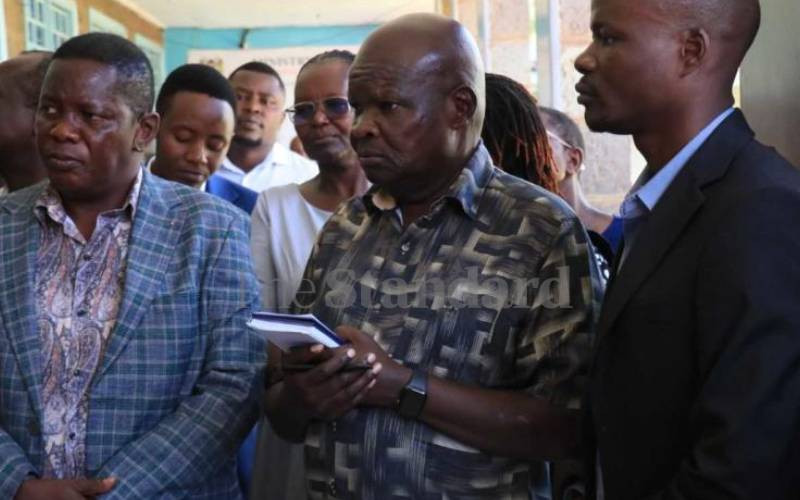
The Mathari National Teaching and Referral Hospital management has appealed to MPs to repeal Section 226 of Kenya's Penal Code, which imposes criminal liability on individuals who attempt suicide.
The management argues that individuals who attempt suicide are often grappling with mental illness and thus require medical intervention rather than punitive measures.
They made the case during a meeting with the National Assembly Departmental Committee on Health, chaired by Endebess MP Robert Pukose.
The hospital bosses advocated for a shift towards prioritising medical care over arrest and prosecution in the cases.
The committee was on a fact-finding mission to understand the challenges facing the mental hospital, and its successes, as well as to ascertain the current status of admitting and treating patients with mental illnesses.
Section 226 of Kenya's penal code currently stipulates that any person attempting to take their own life is guilty of a misdemeanour, subject to imprisonment of up to two years, a fine, or both, with the minimum age of prosecution set at 8 years old.
The hospital's Chief Executive Officer Julius Ogato, said the law as currently constituted can push people with mental illness to the edge.
"Initially, people thought that a person contemplating suicide is abnormal, but that is not true. Just as diabetes results from a lack of insulin in the body, mental illness involves an imbalance of chemical transmitters in the brain. There is a biological basis for such thoughts. When someone exhibits these thoughts, they require empathy and much-needed support to access treatment," said Dr Ogato.
- Meet mental health coach 'Hummingbird,' healing hearts and saving one soul at a time
- 'I want to stop': Young Kenyans open up about struggle with masturbation
- Mental health: Why men need safer spaces to speak up
- Unmasking the pain behind men's mental health
Keep Reading
"But when it is a criminal act, it is reported to the police not to the hospital, by doing this, we deprive the social liberties of the person who is sick and take him or her away from seeking treatment," he added.
He told the Dr Pukose-led committee that individuals with suicidal thoughts require rescue, protection, care and not incarceration.
Dr Ogato proposed that by reclassifying attempted suicide as a mental disease rather than a criminal act, perceptions would shift, and people would understand that those with mental illness require assistance, not punishment.
"This is a crucial step in combating the stigma associated with suicide and mental illness. Currently, individuals with suicidal ideation are viewed as weak. This perspective needs to change. We should approach it like any other medical condition, such as diabetes," he said.

According to the World Health Organisation, approximately 700,000 individuals die by suicide annually, making it the second leading cause of death among individuals aged 15-29. It ranks among the top ten leading causes of death across all age groups.
In Kenya, at least four people die by suicide each day, with an average of 20 times as many attempting suicide.
However, these figures are likely conservative due to the taboo nature of suicide and its legal ramifications, which discourage open discussion.
Traumatic experiences, coupled with stigma, drive some individuals to attempt or complete suicide.
Pukose echoed the hospital CEO's sentiments, saying criminalising suicide worsens the suffering of individuals who are already in a vulnerable state
"It violates their fundamental human rights and dignity by subjecting them to punitive measures instead of offering support and assistance," he said.
He underscored the importance of recognising suicide as a mental health issue rather than a criminal act.
The MP argued that decriminalising suicide would enable Kenya to adopt a more compassionate approach, encouraging individuals to seek help without fear of legal repercussions.
"Decriminalisation would facilitate better access to mental health services and suicide prevention initiatives. It would reassure individuals contemplating suicide that seeking help will not lead to legal consequences," he said.
Pukose pledged to lead the committee in building consensus in repealing Section 226 of the penal code.
Dr Mercy Karanja, psychiatrist and head of clinical services at Mathari National Teaching and Referral Hospital, opposed the criminalisation of suicide, saying that it obstructs access to vital healthcare services for those grappling with mental illness.
"We advocate for the amendment of Section 226 of the Penal Code because, besides being caregivers to individuals with mental health challenges, we stand as their voice," said Dr Karanja.
She highlighted the deterrent effect of the fear of criminalisation on individuals seeking help for suicidal tendencies, emphasizing the need for legal reforms to facilitate mental health care.
Additionally, Dr Karanja pleaded with the health committee to review legislation such as the Prisons Act and the Police Act, which affect the hospital's operations regarding the reception of prisoners referred by the Prison Department or the Judiciary.
"These Acts directly impact us, and we are working with our legal team to clarify specific sections, particularly those in the Police Act and Prisons Act. Additionally, the Mental Health Amendment Act of 2020 requires further amendments to ensure the establishment of mental health services across all counties," she said.
The facility also raised concerns about individuals with intellectual and psychosocial disabilities arrested for attempted suicide being detained at the hospital without trial for extended periods, surpassing the penalty stipulated in the Penal Code.
Dr Ogato disclosed that hundreds of patients had been abandoned at the facility by their families, even after fees were waived.
Attempts to repatriate them were often met with resistance, with staff sometimes being forced to accompany them back to the facility.
"So this really becomes a social protection issue and is not should not be within the purview. We requested that the relevant committee dealing with social protection and the relevant State Department be brought on board to take care of people with severe mental illness who need social protection," said the CEO.
 The Standard Group Plc is a multi-media organization with investments in media
platforms spanning newspaper print
operations, television, radio broadcasting, digital and online services. The
Standard Group is recognized as a
leading multi-media house in Kenya with a key influence in matters of national
and international interest.
The Standard Group Plc is a multi-media organization with investments in media
platforms spanning newspaper print
operations, television, radio broadcasting, digital and online services. The
Standard Group is recognized as a
leading multi-media house in Kenya with a key influence in matters of national
and international interest.











